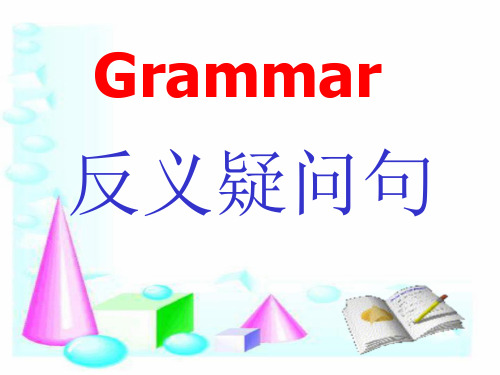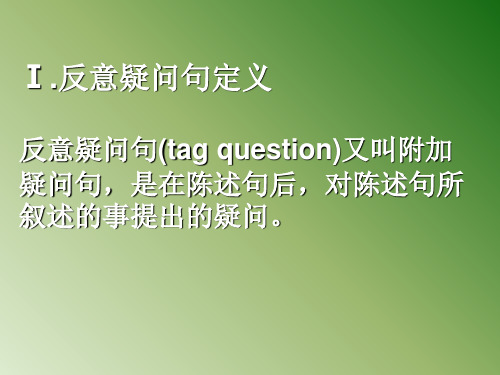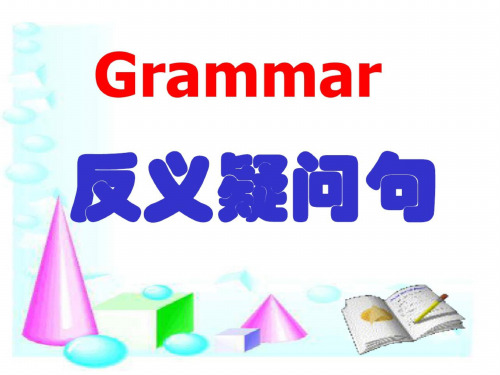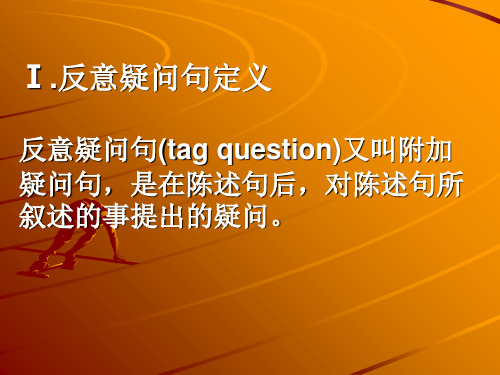反义疑问句课件(初中)
合集下载
九年级英语反义疑问句课件1

反义疑问句
Such things ought not to allowed,
Heห้องสมุดไป่ตู้ought to be punished
We ought to go,
反义疑问句
We need to do it, You daren’t go there, You must go home right now,
We have to get up at four tomorrow,
They had to leave early,
反义疑问句
He used to leave in London,
There used to be a cinema here before the war,
于是,三毛将昔日的一段往事,写成了这万八字的绝世散文,题名为《倾城》,再三读之,回味有余,既有荡气回肠之痛快又有颇令人魂牵梦绕的柔情,扰人心扉。你说,一个身处异乡的,孤独苦读的 学生只怕连他自己也没有想到竟会发生这样令人终身难忘的一幕吧。然而,我想世间的许多偶然的事情中也存在着必然,所以不要问不要问为什么,这场美丽的邂逅如期发生了。它是那样的短暂,那么 灿烂,是那么苦,又是那么甜。但我也是百思不得其解,这怎么会让三毛想到了死呢中医养生加盟艾灸馆加盟 读到这段,我情不自禁,泪流满面。三毛说他拿着初级班成绩结业单,飞奔去邮局挂号寄给父母,在那个飘着茫茫大雪的天气里,寄完了那封信。回来的路上,她愉乐的流下了眼泪。可能这与我现在的 心境极为相似,我感同身受,就是想撕心裂肺,痛痛快快,大哭一场的那种,但说不出来的成就感。那种感觉真的真的很让我留恋,思绪倒流到过去,此情此景和我高四时候的心境和处境几乎是如出一 辙,想想那年的自己只顾埋头伏案苦读,其他什么事情都进不了自己的大脑,其实也是无暇去想。就像三毛说的那样,那一年里自己几乎没有一点欢乐,没有一点点物质享受,也没有一点时间去过一个 年轻女孩该过的日子,而内心里有的只是些许的无可奈何,还有那冷冷的辛酸。 她自述回忆那个日子她很清楚的记得,那是十二月三日,一九六九年的冬天。当天三毛努力争取签证失败后,一个人就站在那个车站,痴痴地看着晃来晃去的人脸。突然,就那一瞬间,对面的大玻璃窗 里有一种好比是放射光线一样的感应,有一个人的眼光不断的放射在她身上,好一会儿,他微微感觉到,她还在看她。后来,等她绕到投币拍快照片的小亭子的时候,那种感应更强烈了。就在她猛一回 身的瞬间,她发觉她身后站着一位就如电影雷恩的儿子里那么英俊迫人的青年军官。读到这的时候,我的心也跟着惊悸了,我想面对着自己面前的这一位帅哥,对于每一个正值年少青春的妙龄少女来说, 春心萌动,想入非非,也是一件无可厚非,理所当然的事情。于是她一直看着他肩上的星,她自然流露夸赞他不但俊美,也有一副感人而燃烧的眼睛。那个人似曾在那里见过。
中考英语复习课件PPT:反义疑问句详细课件(PPT27张)

[正] Tom can speak Chinese well, can’t he﹖
一般现在时: Lily likes going shopping, doesn’t _______she? are They aren’t students, _______ they? 现在进行时: You’re going to the cinema, _______ aren’t you? is She isn’t waiting for me, _______ she?
2.当陈述部分的主语是everybody, everyone, someone, no one, nobody, somebody等指人的不定代词时,反意 疑问句的附加部分的主语通常用they,但 也可用he。例如: 1)Everybody is here, isn’t he? 2)Nobody wants to go there, don’t they?
5.陈述部分带有 never, few, little, hardly,seldom,nobody,none,no, too…to, nothing等否定意义的词时, 反意疑问句的附加部分的动词用肯 定形式。 例如: Few people know him, do they? She never goes swimming, does she?
Nothing could stop them, could it?
Everything is ready, isn’t it?
6 当陈述部分动词为have(has)时,有以下几种 情况: 1)Have在一般现在时中表示“有”之意,附加 问句的谓语可用have也可用助动词do.
Hale Waihona Puke Eg Tom has a new watch ,hasn’t /doesn’t he?
九年级英语反义疑问句课件1

棉花是一场战争。即使当下,这也是一场看不见硝烟的战争。但姐姐和姐姐一样的百万拾棉人不知道,这些匍匐在棉田的人,在没有棉花,没有泥土纤尘不染的高楼华屋里,在资本市场涨跌的曲线 上,在觥筹交错的机锋中,还有很多的金融大鳄,在期货市场做着棉花的梦。那些买卖棉花期货的远离土地的金融弄潮儿,他们只是见过图表,但他们就根本没见过棉花,他们因为棉花一夜暴富一夜负 债一夜跳楼,一路凯歌一路悲歌,一路红粉地毯一路阎王殿。但棉花还是棉花,土地还是土地,日子还是日子。但我知道,说不定哪一朵棉花哪一根纱线哪一批布匹,就有姐姐的泪姐姐的汗和姐姐手上 的血。正规平台打卡赚钱的有哪些
姐姐到新疆拾棉花,前后去了三次。但在第三次,姐姐到了新疆在棉田里待了半晌,家里就接到包工头的电话,说姐姐像是去看望姐姐的,已经五年未见。第二天,我曾在微信上写了这样的句子:“姐姐的八岁/她的童年抱着/我,那年秋天雨注四十二天/我的脐带渗血四十二天/姐姐的六十二 岁/她抱着/五岁的孙女/姐姐十五岁/拉载重一千八百斤的地排车/车上有时是四到六个三百五十斤重的汽油桶/有时是八到十个两百斤重的粮食麻袋/姐姐三十岁/和村中恶男骂仗/后从家中取出刨红薯的铁 抓钩/一下砸折恶男腿骨/乡间为之侧目/姐姐五十五岁后/三到新疆拾棉花/坐绿皮火车两次/坐大巴一次/历三个昼夜,姐说/在火车上人挤如集上卖的猪秧子(猪崽)/最后一次去新疆拾棉花/只一天,她就晕 倒在棉田里/二外甥坐飞机去接她/姐姐平生第一次坐上了飞机/这一次把她前两次拾棉的钱都/赔进去了/昨天,去看姐姐/她停下喝了几十年的酒/茶也不喝了/改成喝蒲公英/外甥和我喝五粮液/姐姐说,好 酒,我也尝一口”。
姐姐到新疆拾棉花,前后去了三次。但在第三次,姐姐到了新疆在棉田里待了半晌,家里就接到包工头的电话,说姐姐像是去看望姐姐的,已经五年未见。第二天,我曾在微信上写了这样的句子:“姐姐的八岁/她的童年抱着/我,那年秋天雨注四十二天/我的脐带渗血四十二天/姐姐的六十二 岁/她抱着/五岁的孙女/姐姐十五岁/拉载重一千八百斤的地排车/车上有时是四到六个三百五十斤重的汽油桶/有时是八到十个两百斤重的粮食麻袋/姐姐三十岁/和村中恶男骂仗/后从家中取出刨红薯的铁 抓钩/一下砸折恶男腿骨/乡间为之侧目/姐姐五十五岁后/三到新疆拾棉花/坐绿皮火车两次/坐大巴一次/历三个昼夜,姐说/在火车上人挤如集上卖的猪秧子(猪崽)/最后一次去新疆拾棉花/只一天,她就晕 倒在棉田里/二外甥坐飞机去接她/姐姐平生第一次坐上了飞机/这一次把她前两次拾棉的钱都/赔进去了/昨天,去看姐姐/她停下喝了几十年的酒/茶也不喝了/改成喝蒲公英/外甥和我喝五粮液/姐姐说,好 酒,我也尝一口”。
反义疑问句详细讲解课件(PPT27张)

I don’t believe he has finished his work.
7.当陈述部分的主句是I think (expect, believe)等结构时,反 意疑问句的附加部分则往往与从 句中的主语和谓语动词保持对应 关系,但要注意否定的转移。 例如:
I think he’s funny, isn’t he? I don’t believe she likes my
You must have seen the film last week, didn’t you?
6. 当陈述部分是I am…时,反意疑 问句部分通常要用aren’t I;如陈述 句部分的主语是I am not时,反意疑 问句部分通常要用am I。 例如:
1)I am a teacher, aren’t I?
Ⅰ.反意疑问句定义
反意疑问句(tag question)又叫附加 疑问句,是在陈述句后,对陈述句所 叙述的事提出的疑问。
Ⅱ.基本结构:
陈述句+逗号+简短的一般疑问句?
遵循前肯定后否定前否后肯式的原则
①前肯后否式。例如:
You are all students, aren’t you﹖
②前否后肯式。例如:
Let’s have a rest, shall we? 以let us开头的祈使句,不包括 说话人在内,因此反意疑问句的 附加部分用will you。例如:
Let us stop now, will you?
Ⅳ. 反意疑问句的回答 “ 根据事实回答”
对反意疑问句的回答,无论问题的提法如何,如果 事实是肯定的,就用yes,事实是否定的,就要用no。 要特别注意陈述句部分是否定结构,反意疑问句部分 用肯定式提问时,回答yes或no与汉语正好相反。这 种省略回答的yes要译成“不”,no要译成“是”。
7.当陈述部分的主句是I think (expect, believe)等结构时,反 意疑问句的附加部分则往往与从 句中的主语和谓语动词保持对应 关系,但要注意否定的转移。 例如:
I think he’s funny, isn’t he? I don’t believe she likes my
You must have seen the film last week, didn’t you?
6. 当陈述部分是I am…时,反意疑 问句部分通常要用aren’t I;如陈述 句部分的主语是I am not时,反意疑 问句部分通常要用am I。 例如:
1)I am a teacher, aren’t I?
Ⅰ.反意疑问句定义
反意疑问句(tag question)又叫附加 疑问句,是在陈述句后,对陈述句所 叙述的事提出的疑问。
Ⅱ.基本结构:
陈述句+逗号+简短的一般疑问句?
遵循前肯定后否定前否后肯式的原则
①前肯后否式。例如:
You are all students, aren’t you﹖
②前否后肯式。例如:
Let’s have a rest, shall we? 以let us开头的祈使句,不包括 说话人在内,因此反意疑问句的 附加部分用will you。例如:
Let us stop now, will you?
Ⅳ. 反意疑问句的回答 “ 根据事实回答”
对反意疑问句的回答,无论问题的提法如何,如果 事实是肯定的,就用yes,事实是否定的,就要用no。 要特别注意陈述句部分是否定结构,反意疑问句部分 用肯定式提问时,回答yes或no与汉语正好相反。这 种省略回答的yes要译成“不”,no要译成“是”。
中考英语-反义疑问句PPT(共46张PPT)

1.反义疑问句 Question Tags
A.目的:我们使用反义疑问句来确认某件事是否是真实的, 或者期望得到对方的肯定回答。
B.构成:陈述部分+附加疑问部分
C.规则: 1.附加疑问部分构成: 由谓语动词的正确形式(be,do ,情态动词)+主格代词 (he,they,it等) 2.时态 陈述部分与附加疑问部分时态保持一致
3) 关于陈述部分的主语和疑问 部分的主语一致问题
陈述部分主语
不定代词everyone,no one, nobody everything,anything,nothing,som ething, this,that one
疑问部 分主语
he/they
it one/he
例句
Everyone is in the classroom, aren't they? Everything goes well, does it? This is your book, isn't it? One can't be always young,can one?
now,_________? 4.It's a nice day,______? 5.Arthur is responsible for the newspaper, ____? 6.Alice has never seen a three-D movie at the cinema,
_______?
动词 + there
There are some apples in the basket, aren't there? There isn't any milk left, is there?
A.目的:我们使用反义疑问句来确认某件事是否是真实的, 或者期望得到对方的肯定回答。
B.构成:陈述部分+附加疑问部分
C.规则: 1.附加疑问部分构成: 由谓语动词的正确形式(be,do ,情态动词)+主格代词 (he,they,it等) 2.时态 陈述部分与附加疑问部分时态保持一致
3) 关于陈述部分的主语和疑问 部分的主语一致问题
陈述部分主语
不定代词everyone,no one, nobody everything,anything,nothing,som ething, this,that one
疑问部 分主语
he/they
it one/he
例句
Everyone is in the classroom, aren't they? Everything goes well, does it? This is your book, isn't it? One can't be always young,can one?
now,_________? 4.It's a nice day,______? 5.Arthur is responsible for the newspaper, ____? 6.Alice has never seen a three-D movie at the cinema,
_______?
动词 + there
There are some apples in the basket, aren't there? There isn't any milk left, is there?
反义疑问句(共14张PPT)全

二、前否+后肯
1.She wasn’t ill last week, was she ? 2.It doesn’t often rain here, does it? 3.Tom won’t go to Shanghai next year,
will he ?
特殊用法1—祈使句的反义疑问句
1、肯定祈使句的反意疑问句,疑问部分用will you或won’t you,否定祈使句则用will you ? 如: Don't do that again, will you? Go with me, will you / won't you?
13、He who seize the right moment, is the right man.谁把握机遇,谁就心想事成。2024/10/172024/10/172024/10/172024/10/1710/17/2024 +14、谁要是自己还没有发展培养和教育好,他就不能发展培养和教育别人。2024年10月17日星期四2024/10/172024/10/172024/10/17 +15、一年之计,莫如树谷;十年之计,莫如树木;终身之计,莫如树人。2024年10月2024/10/172024/10/172024/10/1710/17/2024 +16、教学的目的是培养学生自己学习,自己研究,用自己的头脑来想,用自己的眼睛看,用自己的手来做这种精神。2024/10/172024/10/17October 17, 2024 +17、儿童是中心,教育的措施便围绕他们而组织起来。2024/10/172024/10/172024/10/172024/10/17
一 、前肯+后否 含be动词
1.He is a doctor, isn’t he? 2.I am Chinese, aren’t I?
人教版初中初三九年级英语 名师教学课件 反义疑问句

before, isn't it ?
2)Bob,you watched the TV show last night,
didn't you?
3)She can hardly speak an English word,
can she ?陈述句+简短一般疑问句
Quick eyes:
1)She is here , isn’t she ? 2)This is my apple, isn’t it ? 3)They do not go to school by bus, do they ?
③ There aren’t any books in his bag, are there?
Are you NO.1?
1.There is a singer in the room, isn’t there? 2.There is some milk in the bottle,isn’t there? 3.There are some birds in the sky, aren’t the?re 4.There isn’t sugar in the glass, is there? 5.There aren’t any apples in the basket,
反 义 疑 问 句
Learning Aims:
To learn,master and useTag questions.
Observe:
It is an apple, isn’t it ?
They are apples, aren’t they ?
The girl is crying, isn’t she ? The girl isn’t crying, is she ?
初中英语《反义疑问句》ppt课件

2) 陈述部分的谓语是wish,疑问部分要用may +主语。 I wish to have a word with you, may I ?
3) 陈述部分用 no, nothing, nobody, never, little , few,seldom, hardly, 等否定含义的词时,疑问部分用 肯定含义。
6 . The boys can swim,___________? 7. Your father will be back in a week, 5
(二)行为动词(当陈述句的谓语是行为 动词时,用don’t ,doesn’t , didn’tains here, ___d_o_e_s_n_’_t _i_t ? 2. You have a headache, ___d_o_n__’t __y_o?u 3. I called you yesterday, ___d_i_d_n_’t__?I
6)陈述部分由neither… nor, either… or 连接的并列主 语时,疑问部分 根据其实际逻辑意义而定。
Neither you nor I am engineer, are we ?
10
Let’s check up!
4)We have to get ther.e at eight tomorrow, don't we? 5)He must be a doctor, isn't he?
9
4)陈述部分有have to +v. (had to + v.),疑问部分常用 don’t +主语(didn‘t +主语)。 We have to get there at eight tomorrow, don't we ?
3) 陈述部分用 no, nothing, nobody, never, little , few,seldom, hardly, 等否定含义的词时,疑问部分用 肯定含义。
6 . The boys can swim,___________? 7. Your father will be back in a week, 5
(二)行为动词(当陈述句的谓语是行为 动词时,用don’t ,doesn’t , didn’tains here, ___d_o_e_s_n_’_t _i_t ? 2. You have a headache, ___d_o_n__’t __y_o?u 3. I called you yesterday, ___d_i_d_n_’t__?I
6)陈述部分由neither… nor, either… or 连接的并列主 语时,疑问部分 根据其实际逻辑意义而定。
Neither you nor I am engineer, are we ?
10
Let’s check up!
4)We have to get ther.e at eight tomorrow, don't we? 5)He must be a doctor, isn't he?
9
4)陈述部分有have to +v. (had to + v.),疑问部分常用 don’t +主语(didn‘t +主语)。 We have to get there at eight tomorrow, don't we ?
- 1、下载文档前请自行甄别文档内容的完整性,平台不提供额外的编辑、内容补充、找答案等附加服务。
- 2、"仅部分预览"的文档,不可在线预览部分如存在完整性等问题,可反馈申请退款(可完整预览的文档不适用该条件!)。
- 3、如文档侵犯您的权益,请联系客服反馈,我们会尽快为您处理(人工客服工作时间:9:00-18:30)。
特殊用法3---There be句型的反意疑问句。
陈述句为There be结构时,附加问句仍用there。
• 1.There is a famous doctor in your homБайду номын сангаасtown,
__is_n__’t__t_h_e_r_e___?
Yes, there is.
• 2.There are many visitors in Beijing now,
Unit 10 It's a nice day, isn't it?
tag questions
It’s cold ,___is_n_’_t _it____? Yes,it is.
They are playing football, aren’t they?
Yes, they are.
They don’t like swimming,__d_o_t_h_e_y__? No, they don’t. They enjoy it a lot.
___d_o_e_s__ _s_h_e__ ? 6. You didn’t call me yesterday,
__d_i_d___ _y_o_u__?
7. You won’t go to U.S.A., __w_i_ll__ _y_o_u_?
8. There isn’t a boy in our classroom,
特殊用法7
主语是everything, something, anything, nothing等不 定代词时,反意疑问句的主语一般用it指代。
• 1.Nothing is important for him, is it? • 2.Something is wrong with your computer,
___i_s__ _t_h_e_r_e__ ? 9. There weren’t many cars in the street,
_w__e_r_e__ _t_h_e_r_e__ ? 10. Don’t smoke, ____w_i_ll_ __y_o_u_ ? 11. Let’s do it, __s_h_a_l_l_ _w_e___ ?
_w__a_s__t_h_e_r_e___? Yes, there was a new TV play. It
was very interesting.
特殊用法4
陈述部分如果有否定意义的词,如:hardly(几乎 不), never(从不), nothing, few, little, no, seldom(很 少), too…to(太…以至于不能) 等, 这时疑问部分要 用肯定形式。
特殊用法2 情态动词的反义疑问句 陈述句+情态动词的简短否定/ 肯定+主语?
• 1) He can play the piano,_c_a_n_’t_h_e___? • 2) He should go right now, __sh_o_u_ld_n_’_t_h_e? • 3)They can’t finish it, _c_a_n_t_h_e_y____?
特殊用法6
主语是everyone, someone, anyone, no one, nobody等 不定代词时,反意疑问句的主语一般用they指代。
• 1.Everyone in your family is fond of swimming, aren’t they ? 你们全家都喜欢游泳,是吗?
• 1.Mr. Smith can hardly speak Chinese, c_a_n__h_e___?
• 2.She has never been to Hong Kong,h_a_s__sh__e_____?
• 3.There is nothing important in the newspaper,
特殊用法1 ---祈使句的反意疑问句:
在祈使句后面附加问句,以加强语气或使祈使 句听起来较委婉、客气。附加问句可选用 “will you? ”“won’t you?”。
祈使句为否定结构时,附加问句一般只用 “will you?”.
陈述句为 “Let’s…” 结构时, 表示建议,其意思 包括对方,即“让我们(你我双方)”附加问句一 般用 “shall we?” 。
• 2.Anyone can do that, __ca_n__’t_t_h_e_y__? • 3.Someone is knocking at the door, __a_r_e_n_’t_t_h_e_y? • 4.No one knows about it, __d_o_n_’t__th_e_y_?
The students were in the classroom,w_e_re_n_’t_t_he_y_?
Yes, they were.
They weren’t in the zoo last Sunday, _w_e_r_e_th_e_y?
No, they weren’t. They went to the mountains.
It rained heavily yesterday, _d_id_n_’t_it__?
Yes, it did.
Liu Xiang won the hurdle race again, _d_id_n_’t_h_e_?
Yes, he did.
There was a heavy snow last year, _w_a_s_n_’t _th_e_re_?
___i_s_n_’t__it______? • 3.Everything is ready for the test, ___is_n_’_t_i_t__?
一切都准备好了,对吗?
陈述句为 “Let us…” 结构时, 表示请求,其意 思不包括对方,即“你让我们…(You let us)”,附 加问句一般用 “will you?”
---祈使句
1. Sit down please, _w__il_l_/_w__o_n_’_t _y_o_u_ ? 2. Please call me, __w_i_ll__/ _w_o_n__’t_y__o_u__? 3. Let’s go home, _s_h_a__ll_w__e________ ? 4. Let us go home, _w__il_l_/_w__o_n_’_t _y_o__u_ ? 5. Don’t leave now, __w_i_ll_y_o__u________?
__a_r_e_n__’_t _t_h_e_r_e_____?
• 3.There will not be any classes tomorrow,
_w__il_l_t_h__e_r_e_______?
No, there won’t.
• 4.There wasn’t anything new on TV last night,
• 2. You haven’t been to the U. S. , have you? __N_o_,_I_h_a_v_e_n_’_t_. __. I want to have a visit one day.
___Y_e_s_,_I_h_a_v_e_.___. I have been there three times.
___i_s_t_h_e_r_e_____? • 4.Few people eat wild animals now, _d_o__th__e_y___? • 5.He knows little German, _d_o__e_s_h_e_____ ?
• 6.You have seldom met him recently, _h__a_v_e_y_o_?u • 7.He is too young to join the army, _is__h_e_______?
Jay sings many songs, doesn’t he ? Yes, he does.
Lily was ill in bed, _w_a_s_n_’t_s_he__?
Yes, she was.
She wasn’t at home, _w_as__sh_e__?
No, she wasn’t.
you last night, ___w_e_r_e_n_’_t_ _y_o_u__ ? 5. She is going to visit me, _i_s_n_’_t _s_h_e_? 6. I am Chinese, _a_r_e_n_’t_ __I____?
行为动词:
1. It often rains here, _d__o_e_s_n_’_t _i_t _ ? 2. He likes soccer, __d_o__e_s_n_’_t _h__e_ ? 3. You have a headache, _d__o_n_’_t _ y__o_u? 4. I called you yesterday, _d_i_d_n_’_t_ _I_?
其它动词:
1. You will go to America, _w_o__n_’t_ _y_o_u? 2. We have ever been to Shanghai,
__h_a_v_e_n__’t_ __w_e___ ?
2. 前否,+ 后肯
1. You aren’t an actor, ___a_r_e_ _y_o_u_ ? 2. He isn’t a good boy, ____i_s_ _h__e__ ? 3. It wasn’t fine yesterday, _w_a_s_ __i_t_ ? 4. It doesn’t rain here, __d_o_e_s_ __i_t _ ? 5. His sister doesn’t have a headache,
